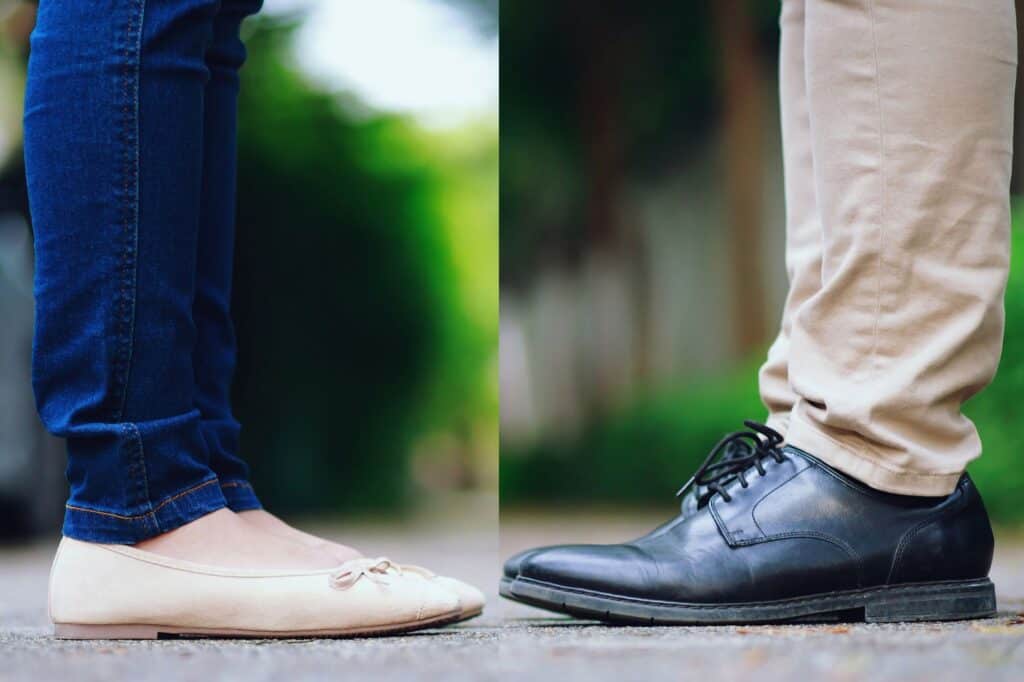Last updated on December 22nd, 2024
Do you often find yourself feeling unsure or hesitant in social settings?
You’re not alone, and there are ways to boost your confidence. It starts with understanding the link between confidence and self-esteem.
Building this connection can help you feel more secure in any situation.
Learning how to project confidence can change the way others see you and improve how you see yourself.
Through using techniques like power poses and maintaining eye contact, you can start to feel more at ease.
These methods can help you shift from feeling nervous to being the center of attention. Start your journey toward greater self-assurance today.
So What Exactly is Confidence?
Confidence is all about having faith in your own skills and qualities.
It’s that feeling you get when you trust yourself and believe you can handle life’s challenges.
Self-confidence is when you feel sure about your abilities, while self-esteem is about how much you value yourself.
Both are super important because they give you the courage to chase your dreams.
When you have a positive self-image, you see yourself in a good light, which boosts your confidence.
This self-assurance empowers you to take on new opportunities, like applying for a new job or asking for a raise.
Confident people often find more success because they’re willing to try new things and take risks.
When you believe in yourself, it opens doors to new adventures and possibilities.
Building your confidence is like laying the groundwork for your future achievements.
How do you show confidence?
Confidence is a journey, not a destination. Realize that feeling unsure sometimes is natural and everyone experiences it.
Owning your imperfections can actually make you stronger.
Adopt a cool and collected vibe.
You don’t have to always be completely chill, but try to keep stress in check during tough moments. Breathing deeply before big events can help center you.
Consider your body language as well. Stand tall, keep your head up, and make eye contact.
A genuine smile when appropriate can also work wonders.
These simple adjustments can support your personal growth and help you exude confidence in a natural and effective way.
1. Show Confidence Through How You Hold Yourself
Why How You Hold Yourself Matters
Your body says a lot even when you’re not talking! Believe it or not, most of what you communicate isn’t spoken.
A huge chunk of your message comes from how you stand, move, and look at people.
If you keep your back straight, look people in the eye, and keep your hands open and relaxed, you let others know you’re confident and friendly.
On the flip side, avoiding eye contact or crossing your arms can make you seem unsure or closed off.
Imagine you’re standing tall with your chest open. This stance, often called power posing, can help boost your confidence levels. Little gestures like nodding when someone is speaking show you’re engaged and respectful.
Mirroring the other person’s gestures can also build rapport because it makes them feel comfortable and understood.
Through focusing on these non-verbal cues, you can project more self-assurance and encourage others to feel at ease around you.
Using confident gestures isn’t just about others perceiving you differently—it’s also about feeling more secure in yourself.
It’s amazing how something as simple as how you stand or smile can create a ripple effect in helping you build confident body language.
2. Keep Eye Contact
Direct eye contact is a powerful way to show confidence. When you make eye contact, it signals that you are interested and engaged with the other person.
While maintaining eye contact can be challenging, it’s worth practicing because it helps build stronger connections.
Finding the right balance is important. Staring too long could make the other person uncomfortable.
On the flip side, if you don’t look at them enough, it might seem like you’re not interested or unsure.
Here are some tips to help you with eye contact:
- Avoid staring: Hold someone’s gaze for a few seconds, look away briefly, and then return your gaze. This shows engagement without seeming intense.
- Limit breaking eye contact: If you need to look away, try to do it briefly. Long breaks may give off the impression of nervousness.
Pairing your eye contact with a firm handshake can also boost how confident you appear.
A solid handshake coupled with consistent eye contact can leave a positive impression.
Using these techniques, you’ll convey your messages more effectively and come across as more self-assured.
Perfecting this skill might take some time, but it can make a big difference in how you connect with others.
3. Keep Your Back Straight
Stand tall. When you keep your back straight, it sends a message of self-assurance to others.
Don’t let your eyes drop to the floor, and don’t let your shoulders slump. Keeping a strong stance does more than show confidence; it helps you feel it too.
Lift your head high. When your body is aligned, it becomes easier to breathe deeply, which is great for your brain.
This extra oxygen boosts your energy and helps you think clearly, making you feel empowered.
Eye contact becomes simpler too, as your open stance naturally guides your gaze. So, maintain a proud posture, with your shoulders pulled back.
4. Keep Still
Feeling nervous often makes you want to move around a lot. You might find yourself tapping your foot, twiddling your thumbs, or playing with your hair.
These habits can make you come across as insecure or even unprofessional. To present yourself better, it’s important to cut down on these movements.
Start by noticing when you fidget. Once you become more aware, you can work on stopping yourself when it happens.
Deep breathing and positive thinking can help you feel more relaxed, making it easier to stay still.
Before important events, try relaxation techniques to calm your nerves.
Focus on what’s happening around you rather than your worries. Remember, keeping still shows confidence and is something you can practice until it becomes natural.
5. The Influence of a Smile
Smiling is an incredible tool that can change how you feel and how others see you.
When you smile, you show confidence and joy.
This simple action lifts your mood and helps those around you feel happier too. Smiling is known to make you look more attractive to others. I
t can also boost your mood, reduce stress, and improve your health.
If you’re feeling anxious or upset, try a smile. Even if the smile isn’t genuine at first, it can still make a difference.
The magic of a smile is real—it might just be the trick to brighten your day.
6. Expressing Yourself with Purpose
To show confidence when you speak, it’s important to be clear and direct with your words.
Knowing exactly what you plan to say and how you want to say it can make a big difference.
Taking the time to prepare and organize your thoughts can boost your confidence and give you a sense of control during your presentation.
A key tip is to maintain eye contact with your listeners.
This not only shows confidence in your message but also helps build a connection and trust with your audience.
Eye contact can make your words more impactful.
Lastly, it’s essential to stay relaxed and true to yourself. Feeling comfortable in your own skin allows your genuine confidence to come through.
No one else is quite like you, so let your uniqueness shine as you speak.
Confidence is not just about the words you use but also how authentically you deliver them.
7. Listening with Purpose
Listening with true intent makes a real difference. You should give the conversation your complete attention, tuning into the main ideas being shared.
Be mindful of the other person’s body language and nonverbal signals. By actively engaging this way, you’ll find it easier to connect and build a trusting relationship with them.
This approach not only strengthens communication but also boosts your own confidence.
8. Keep Your Legs Uncrossed
To present yourself as open and self-assured, keep both feet flat on the floor without crossing your legs.
This simple posture makes you appear more at ease and approachable. Through avoiding crossed legs, you prevent giving off vibes of nervousness or being closed off.
Lean forward slightly if needed to show interest and engagement.
9. Ways to Assert Yourself
Standing up for yourself is key to showing confidence. It’s about speaking your mind and defending your beliefs, even when they’re not the most popular.
Here are some tips to help you assert yourself:
- Believe in Yourself: Confidence starts within. Trust your own views because if you don’t, it’s hard to expect others to do so.
- Be Prepared: Know what you want to say. Think through your points ahead of time so you don’t get caught off guard during discussions.
- Speak Clearly and Calmly: When you express yourself, stay calm and keep your voice steady. This shows you’re confident and in control.
- Practice Active Listening: Understand the other person’s perspective. It allows for a smoother conversation and shows respect even when you disagree.
Overcoming obstacles like fear of judgment or rejection can be challenging, but standing firm is a step toward confidence.
10. Stay Optimistic
Adopting a positive mindset can be incredibly beneficial for your mental health.
Through focusing on positive self-talk and reinforcing affirmations like “I can do it,” you shift your focus away from negative self-talk. This kind of thinking encourages a healthier perspective.
You can create a ripple effect, where your positive energy inspires those around you to think positively as well.
Remember to keep your thoughts optimistic and embrace a bright attitude.
With these habits, you’ll exude an energy that uplifts not just yourself, but others too.
11. Dress to Impress
Choosing the right outfit can boost your confidence.
It’s not about wearing pricey clothes; instead, focus on those that fit well and suit the occasion. When unsure, lean towards dressing up a bit more.
Overdressing gives you the option to adjust, like removing a jacket if needed.
Attention to detail can also enhance your confidence. Ensure your clothes are clean and free from wrinkles.
Polished shoes and neatly done hair and makeup contribute to a polished look.
Tips for Dressing with Confidence:
- Opt for well-fitting clothes
- Keep attire neat and tidy
- Choose accessories wisely
- Be prepared to adjust if necessary
Don’t overlook the power of accessories. They add personality and can make an outfit feel complete, reinforcing your confidence.
12. Ways To Practice Self-Compassion
Self-compassion is about being kind to yourself, especially when things don’t go as planned. Everyone makes mistakes, and it’s important to remember that you’re not alone in this.
Journaling can be a powerful tool to reflect on your thoughts and emotions.
Write about your experiences and be open about your feelings. This helps you see patterns and understand yourself better.
Try focusing on your strengths instead of your flaws. List things you’re good at and what makes you unique.
This habit can boost your confidence and motivate you to take on new challenges.
When you stumble, acknowledge it without harsh criticism. Learn from the experience and move forward.
Regular self-reflection can improve how you treat yourself. If you find yourself being overly critical, pause and rethink.
Consider what you might say to a friend in the same situation.
Would you be this harsh on them? Show yourself the kindness you’d offer others. By practicing self-compassion, you’ll find your confidence growing each day.
13. Tips for Setting Boundaries
Setting boundaries is key to feeling confident and secure in various aspects of life.
Through establishing clear limits, you ensure that you don’t take on too much and become stressed. This helps you keep your focus sharp on what’s important.
Be Assertive: It’s vital to communicate your boundaries clearly. If you can’t take on extra work because of previous plans, calmly explain that you have other commitments.
Likewise, in social settings, don’t feel pressured into activities like drinking if you’re not comfortable. It’s perfectly acceptable to say no.
Energy Focus: By understanding your limits, you allocate your time and energy more effectively.
This prevents feelings of being spread too thin and allows you to concentrate fully on tasks or activities that matter to you.
Adaptability: Setting boundaries doesn’t mean rigidly sticking to them without flexibility.
Sometimes, you might need to adjust based on the situation while still maintaining your core values.
14. Ways to Stand Up for Yourself
Being assertive is a valuable skill that helps you express yourself clearly while respecting others.
This ability can improve both personal and professional relationships. When you stand up for your beliefs, you’re likely to build stronger connections with those around you.
15. Steps to Avoid Comparing Yourself to Others
Comparing yourself to others is a habit that can drain your confidence. Each person is on a unique path in life.
When you compare yourself with others, you might feel stuck or less accomplished.
Here are some strategies to help break free from this cycle:
- Self-Acceptance: Embrace your true self. Feelings of self-doubt can lead to comparison. By accepting who you are, you build confidence.
- Mindful Thinking: Pay attention to your thoughts. If you catch yourself comparing, pause and redirect your focus. Practice gratitude for what you have instead of what you lack.
- Focus on Your Journey: Remember that everyone’s progress is different. Dwelling on others’ achievements can make you feel inadequate. Concentrate on your own growth and how far you’ve come.
Building resilience and maintaining a growth mindset help in staying focused on personal self-improvement instead of external comparisons.
Remember, your journey is yours alone.
Prepare Yourself for Success
Confidence is the secret ingredient for reaching your goals. Start your journey by listing your achievements.
Whether they are big or small, writing them down can boost your confidence.
Think of this list as a reminder of everything you are capable of accomplishing.
Surround yourself with positive people who lift you up.
Their support and encouragement can help you believe in your own abilities. Friends, family members, and colleagues who cheer you on can make a big difference.
Every day, take a moment to visualize your success. Picture yourself reaching your goals and enjoying the victory.
Imagine the steps you took to get there and the happiness it brings. This mental practice makes achieving your dreams feel more possible.
Remember, continuous learning keeps you moving forward. Always be open to new ideas and skills. It keeps your mind sharp and ready for new opportunities.
Conclusion: You’ve Got This!
You’ve read all the way through, and now it’s time to show the world your confidence! Keep in mind that confidence makes a real difference, so don’t hold back.
Step into any situation with the assurance that you can handle whatever comes your way.
With these 16 practical tips, you’re bound to make a memorable impact. Whether it’s walking with purpose or speaking with conviction, each step counts.
Ask yourself: What’s your favorite way of displaying your confidence? How do you let others see your self-assured nature?







